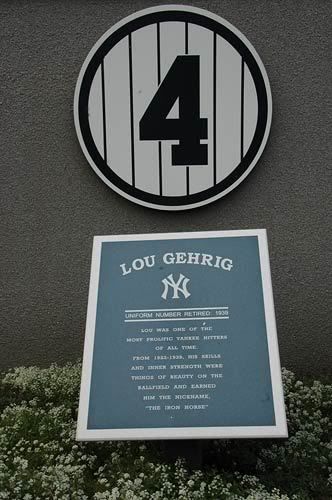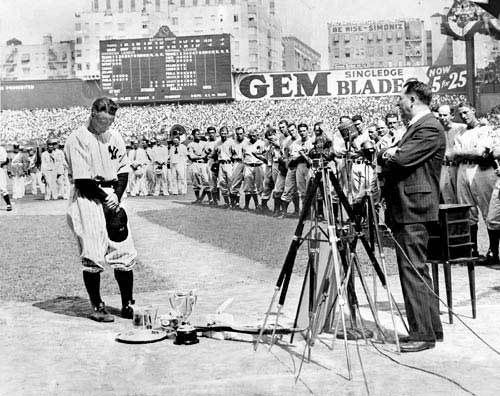 Lou Gehrig, a native of New York City played 1st base for the fabled New York Yankees. His storied career spanned 17 years, from 1923 to 1939 cementing himself as a true legend of the game. Playing along side fellow Hall of Famer Babe Ruth, the formidable duo wreaked havoc among opposing pitching. Not only was Gehrig known for his offensive prowess, he was also the model of consistency in the field playing for a total of 2,130 consecutive games until he was felled by a fatal disease.
Lou Gehrig, a native of New York City played 1st base for the fabled New York Yankees. His storied career spanned 17 years, from 1923 to 1939 cementing himself as a true legend of the game. Playing along side fellow Hall of Famer Babe Ruth, the formidable duo wreaked havoc among opposing pitching. Not only was Gehrig known for his offensive prowess, he was also the model of consistency in the field playing for a total of 2,130 consecutive games until he was felled by a fatal disease.Amyotrophic lateral sclerosis (commonly known ALS) often referred to as "Lou Gehrig's disease" is a progressive neurodegenerative disease that affects nerve cells in the brain and the spinal cord. Motor neurons reach from the brain to the spinal cord and from the spinal cord to the muscles throughout the body. The progressive degeneration of the motor neurons in ALS eventually leads to their death. When the motor neurons die the ability of the brain to initiate and control muscle movement is lost. With voluntary muscle action progressively affected, patients in the later stages of the disease may become totally paralyzed.
At first, Gehrig skills slowly degenerated. Plays that Gehrig made with ease seemed to take more effort to make. Balls that Gehrig easily sent into the stands were now easy pop-outs. Even normal activities such as walking short distances were a chore for Gehrig. It was within this scenario, that on May 2, 1939, that as Yankee captain Lou Gehrig played his final game for the Yankees.

It was at the suggestion of New York sportswriter Paul Gallico for a day of recognition for Gehrig, that July 4th, 1939 will be forever linked to Yankee history. In front of over 62,000 fans and many teammates (including Babe Ruth), Lou Gehrig gave his famous and emotional farewell speech. Fighting back tears, Gehrig uttered the following words:
"Fans, for the past two weeks you have been reading about the bad break I got. Yet today I consider myself the luckiest man on the face of this earth. I have been in ballparks for seventeen years and have never received anything but kindness and encouragement from you fans.
"Look at these grand men. Which of you wouldn't consider it the highlight of his career just to associate with them for even one day? Sure, I'm lucky. Who wouldn't consider it an honor to have known Jacob Ruppert? Also, the builder of baseball's greatest empire, Ed Barrow? To have spent six years with that wonderful little fellow, Miller Huggins? Then to have spent the next nine years with that outstanding leader, that smart student of psychology, the best manager in baseball today, Joe McCarthy? Sure, I'm lucky.
"When the New York Giants, a team you would give your right arm to beat, and vice versa, sends you a gift - that's something. When everybody down to the groundskeepers and those boys in white coats remember you with trophies - that's something. When you have a wonderful mother-in-law who takes sides with you in squabbles with her own daughter - that's something. When you have a father and a mother who work all their lives so you can have an education and build your body - it's a blessing. When you have a wife who has been a tower of strength and shown more courage than you dreamed existed - that's the finest I know.
"So I close in saying that I may have had a tough break, but I have an awful lot to live for. Thank you."

For the audio version of the speech, click on any of the following links:
| File type | File size | Free Player |
| Wav | 156 kb | |
| MP3 | 220 kb | |
| Ram | 253 kb |
Lou Gehrig passed on almost two years later. On June 2, 1941, Lou succumbed to the disease that would bear his name. His ashes are buried at Kensico Cemetary in Valhalla New York.